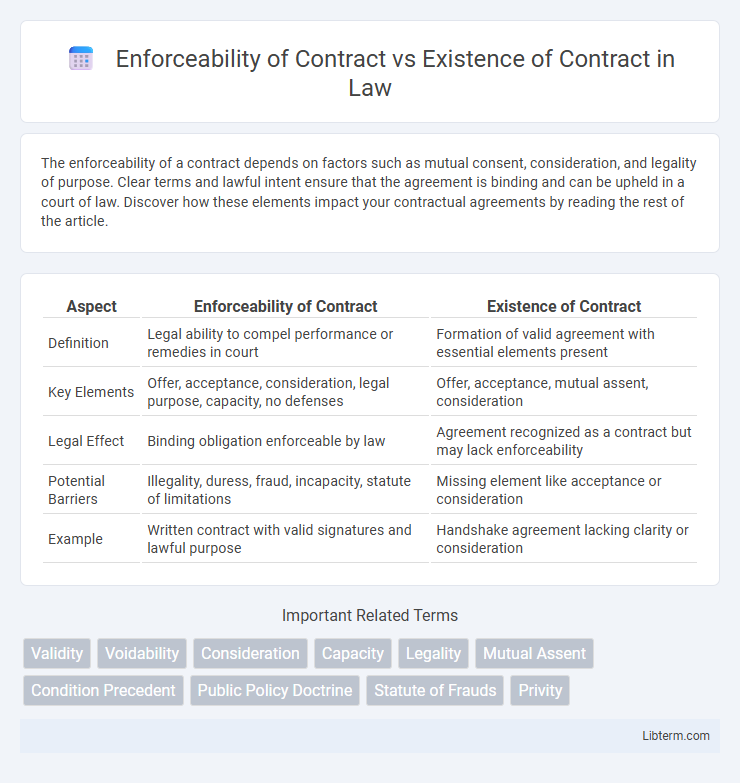The enforceability of a contract depends on factors such as mutual consent, consideration, and legality of purpose. Clear terms and lawful intent ensure that the agreement is binding and can be upheld in a court of law. Discover how these elements impact your contractual agreements by reading the rest of the article.
Table of Comparison
| Aspect | Enforceability of Contract | Existence of Contract |
|---|---|---|
| Definition | Legal ability to compel performance or remedies in court | Formation of valid agreement with essential elements present |
| Key Elements | Offer, acceptance, consideration, legal purpose, capacity, no defenses | Offer, acceptance, mutual assent, consideration |
| Legal Effect | Binding obligation enforceable by law | Agreement recognized as a contract but may lack enforceability |
| Potential Barriers | Illegality, duress, fraud, incapacity, statute of limitations | Missing element like acceptance or consideration |
| Example | Written contract with valid signatures and lawful purpose | Handshake agreement lacking clarity or consideration |
Understanding Contracts: Existence vs. Enforceability
The existence of a contract depends on the presence of offer, acceptance, consideration, and mutual intent to be bound, which collectively establish a valid agreement between parties. Enforceability requires that the contract meets legal criteria such as legality of purpose, capacity of parties, and compliance with statutory requirements; contracts lacking these elements may exist but remain unenforceable. Distinguishing between existence and enforceability is critical for determining whether a contract can be upheld in court or voided due to defects like fraud, duress, or impossibility.
Defining the Existence of a Contract
The existence of a contract is established when there is a valid offer, acceptance, mutual consent, and an intention to create legal relations between the parties involved. Essential elements such as consideration, capacity, and legality must be present for a contract to be recognized legally. Without these fundamental components, the contract cannot be said to exist, regardless of its enforceability.
Key Elements Required for a Contract to Exist
The existence of a contract hinges on key elements such as offer, acceptance, mutual consent, consideration, and legal capacity of the parties involved. Enforceability of the contract requires that these elements be present alongside a lawful object and compliance with statutory requirements. Without these foundational components, an agreement may lack enforceability despite the appearance of a contract.
What Makes a Contract Enforceable?
A contract becomes enforceable when it meets essential elements: mutual consent, lawful consideration, legal capacity of parties, and a legitimate purpose. Clear terms, offer and acceptance, and compliance with statutory requirements further solidify enforceability. Absence of these criteria can result in a contract's existence without enforceability.
Differences Between Contract Existence and Enforceability
Contract existence requires mutual agreement, lawful purpose, and consideration, establishing the foundation of a valid contract. Enforceability depends on the contract's compliance with legal formalities, capacity of parties, and absence of defenses such as fraud or duress. Differences between existence and enforceability affect whether a contract is merely valid in theory or can be upheld and executed in a court of law.
Common Issues Affecting Enforceability of Contracts
Enforceability of a contract hinges on the presence of valid elements such as mutual consent, lawful consideration, and legal purpose, distinguishing it from mere existence, which requires only agreement between parties. Common issues affecting enforceability include lack of capacity, duress, fraud, undue influence, and ambiguity in terms, which may render a contract voidable or void despite its existence. Courts often scrutinize these factors to determine whether contractual obligations can be legally upheld.
Legal Consequences of Non-Enforceable Contracts
Non-enforceable contracts, unlike existing valid contracts, lack legal binding power, resulting in parties being unable to compel performance through court action. The absence of enforceability often arises from issues such as illegality, incapacity, or lack of required formalities, which negate contractual obligations despite mutual agreement. Legal consequences include the inability to claim damages or specific performance, leaving affected parties with limited remedies and increased risk in business or personal transactions.
Case Studies: Existence Without Enforceability
Case studies revealing contract existence without enforceability often involve agreements lacking essential elements such as mutual consent or lawful consideration, rendering them void or voidable despite formal execution. For instance, contracts formed under duress or involving illegal subject matter demonstrate existence without enforceability, as courts refuse to uphold such agreements. Legal precedents like *Lucy v. Zehmer* highlight the distinction where apparent agreement exists, yet enforceability hinges on genuine intent and compliance with statutory requirements.
Practical Steps to Ensure Contract Enforceability
Ensuring contract enforceability requires clear, mutual consent, lawful purpose, and capacity of parties to contract. Practical steps include drafting precise terms, obtaining written signatures, and maintaining evidence of agreement such as emails or recorded communications. Regularly reviewing contract compliance and seeking legal review before execution further solidify enforceability and reduce risks of disputes.
Expert Insights: Navigating Contractual Disputes
Expert insights reveal that the enforceability of a contract hinges on legal elements such as mutual consent, consideration, and lawful purpose, differentiating it from mere existence which only requires an agreement between parties. Contractual disputes often arise when a valid contract exists but one party contests enforceability due to issues like incapacity, duress, or illegality. Skilled legal professionals emphasize thorough contract analysis and clarity in terms to navigate these disputes and ensure enforceability in complex commercial transactions.
Enforceability of Contract Infographic

 libterm.com
libterm.com